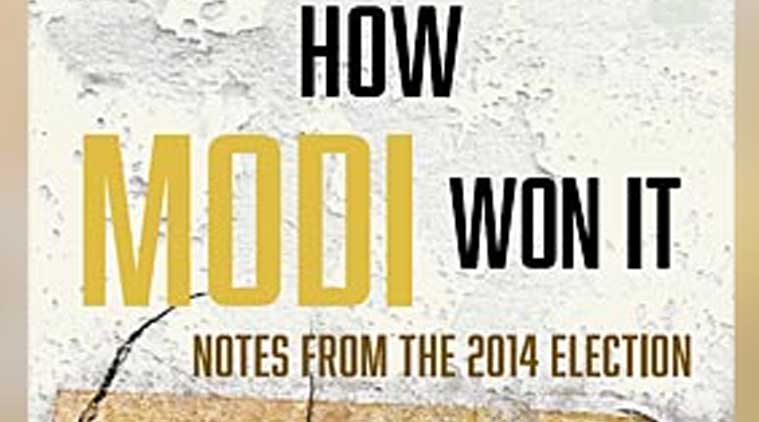How Not to Read an Election
This mix of second-hand gossip and first-hand conspiracy theories tells you zilch about Verdict 2014
 These are not notes from the election diary of a player or of the meticulous observer, offering peeks from behind the curtain or retrieving images that passed unnoticed in the unfolding of a historic election.
These are not notes from the election diary of a player or of the meticulous observer, offering peeks from behind the curtain or retrieving images that passed unnoticed in the unfolding of a historic election.
Book: How Modi Won It: Notes from the 2014 election
Authors: Harish Khare
Publishers: Hachette
Pages: 256 pages
Price: Rs 599
From march 26 till May 17, 2014, Harish Khare made notes, more or less daily, to write a book about the election Modi won. He never wrote it. Because, surely, How Modi Won It, half-diary, full cop-out, is not that book.
If Khare had written the book he set out to write, he would have discovered that many of those scribbles, reproduced in the first half of How Modi Won It, needed to be scratched out. These are not notes from the election diary of a player or of the meticulous observer, offering peeks from behind the curtain or retrieving images that passed unnoticed in the unfolding of a historic election. Khare’s jottings record loose observations and opinions, overtaken and made irrelevant by later events.
Khare’s main thesis is gleaned from an Ashok Vajpeyi poem he quotes, Awaiting a felon: “We have all been told he is coming/… It is difficult to say if he is imposing himself, or/If the masses are propping him up…” Khare’s account of Modi’s victory alternates between accusing Modi of winning, and blaming the voters for it.
When he is not reproducing excerpts from the published journalistic writing of the day, he quotes anonymous friends, journalists and bureaucrats. “A retired senior bureaucrat, just back from a visit to Kerala, told me over dinner…”, “A senior police officer told us over lunch…”, “A well-connected journalist told me…”, “Over lunch with four journalist friends…”, “A senior editor, very well clued into the diplomatic community’s calculations and concerns about the Indian scene…” Shadowy figures, whose identity is kept secret for reasons unknown, since they never spill any secrets, flit in and out of the first half.
Admittedly, Khare has warned the reader. At the beginning of the book, he has told us that it is “an individualistic, partisan and necessarily subjective account… there is no inside information; no scoop; no breaking news.”
Yet, forewarned or not, the reader will judge this book by Khare’s formidable reputation as political scientist, commentator and writer of fine columns. As media advisor to Prime Minister Manmohan Singh between June 2009 and January 2012, Khare also enjoyed a unique inside view of India’s politics and governance.
From him, this compendium of second-hand gossip and first-hand conspiracy theorising is a let-down. For a striking example of the first, turn to page 59, where Khare tells the story told to him by a journalist friend, who went to a Chinese restaurant in Vasant Kunj, where he sat a table away from Rahul Gandhi who was having dinner with four or five people: “…none of them was a politician; there was one woman wearing a short dress” and “the talk was totally non-political…” “This was a truly revealing and shocking tale”, writes Khare. Why, Mr Khare?
And on page 71, he quotes a piece by Pratap Bhanu Mehta, Indian Express columnist, and says: “I have an uneasy feeling, but no concrete facts to base my belief that a sophisticated effort has been initiated to armourplate Modi with intellectual respectability…” Again, why, Mr Khare, must we go by your uneasy feelings? And why write if you don’t have the facts?
This is a disappointing book also because the story of the 2014 election is yet to be written beyond unedited scribbles and cutesy anecdotes. Modi’s victory is still to be accounted for. The success of the man who had the shame of Gujarat 2002 on his political record, the great polariser who kept adding tactics and appeal to his arsenal. He was helped by his listless opposition, but it was more than that. He became what the people wanted him to be and he was a masterful player of the social media. But it was more than that.
For avowedly secular storytellers, particularly, the test is this: will they shy away from the intellectual challenge of piecing together this narrative with the inconvenient ending by taking recourse to mystification and cynicism, or painting opaque oppositions and sinister convergences of interests? And, when all else fails, by blaming the people?
At various points, Khare writes of Modi as “clever”and “cunning”, a “conjurer”, of his ability to produce “a strange alchemy”. He writes of the voter “enticed and tricked” and of a battle between “secularism” (quotes are mine, Khare does not problematise the secularism claim) and the “tempting offer of majoritarian authoritarianism”.
He writes of Indian society being in thrall of a “badtameez moment”, of Sonia Gandhi being “like Waheeda Rehman of Guide, graceful and gentle” while “Narendra Modi was Katrina Kaif from Dhoom 3, all energy, motion and perspiration”. On page 221, he concludes: “A Narendra Modi victory was possible in 2014 because India had changed, and changed dramatically — and he was in sync with the taste, temper and temptations of the times. He was crude, vulgar, cheap and coarse during his campaign — and he was in tune with coarsened Indian social manners and cultural tastes”.
This is no penetrating analysis. Even as a lament, it is crude.



- 01
- 02
- 03
- 04
- 05
























